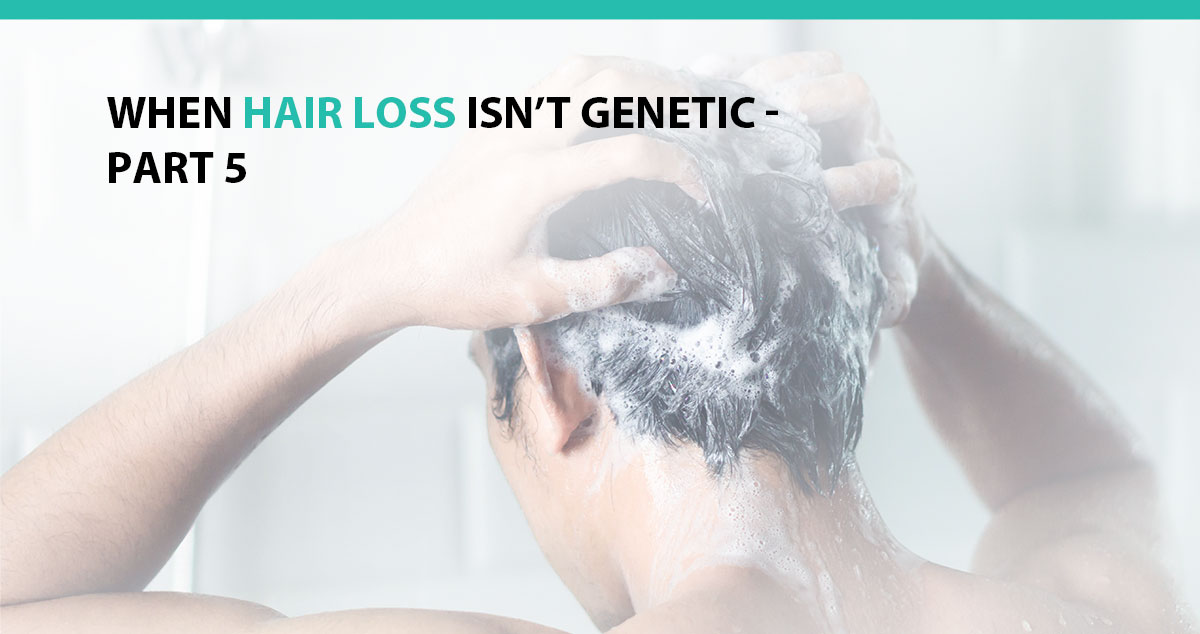
See previous articles in this series.
While science has shown we’re not actively to blame for most hair loss (thanks for nothing, genetics!), there are still several ways we damage our hair. Paying attention to what we can control is the first step to doing our part for a healthy scalp and hairline.
Cleaning
An often overlooked aspect when it comes to stimulating follicles for growth? How we wash our hair. We tend to over-wash our hair, which strips it of its natural oils and can dry it out. The result? More brittle, fragile, delicate hair.
Do This
Do aim to shampoo your hair only a few times per week, depending on your hair type and how quickly it gets oily. You know your hair better than anyone, so pay attention to how often shampooing works best. It’s also important to rinse your hair with cold water after you’ve shampooed. Why? Because it helps seal the follicle, strengthen it, and even combat oiliness.
Don’t Do This
Don’t be harsh with your hair, especially when it’s wet and more prone to damage. If you brush right out of the shower, use a brush that’s specifically made for wet hair to help prevent pulling and breakage. If you must treat your hair with chemicals and dyes, do so with caution! Also, be sure to protect your hair with specially designed sprays as much as possible, especially when dealing with curling and flat irons.
Grooming
Haircare and regular grooming will keep your hair looking great and manageable. However, some grooming practices can lead to hair loss due to trauma and inflammation. Tight hairstyles cause temporary hair loss, known as traction alopecia, while heat styling, hot oil, and chemical treatments can damage your hair follicles resulting in potentially permanent hair loss.
Do This
Do adopt a gentle grooming routine that works for you, one that is not too often or too seldom. Utilize haircare products with natural ingredients and change out products based on their performance.
Don’t Do This
Don’t over-stress your hair. What’s one of a hair follicle’s biggest enemies? Harsh treatment! Over-grooming, the use of harsh products like dyes and bleaches, or styling techniques that subject the hair follicles to excessive stress can impede hair growth. Aggressive brushing or the application of strong chemical-based products can damage the hair follicles and hinder healthy growth.
Maintenance
When it comes to hair growth, don’t underestimate the power of brushing! By regularly brushing your hair, you ensure the oils get distributed all over, which helps protect the hair by locking in moisture.
Do This
Do find the sweet spot for the amount of brushing that keeps your hair healthy. Brushing acts as a mini scalp massage, stimulating blood circulation and therefore, growth.
Don’t Do This
Don’t ignore keeping your hair trimmed. Snip off ends before they can split to avoid losing volume, shine, and smoothness.
Extras
What about overlooked areas of treating our hair and scalp as best we can? Here are some ideas for the perfectionists who want to make sure all bases are covered.
Do This
Do massage your scalp. We could all benefit from a massage, and hair follicles are no exception! It helps get your blood running, and those dilated blood vessels encourage hair growth.
It’s believed that scalp massages stretch the cells of the hair follicles. That alone stimulates the follicle to produce even thicker terminal hair. Plus, scalp massages have the added benefit of releasing stress and tension!
Don’t Do This
Don’t forget your pillowcase. A lot of damage actually happens to your hair while you sleep, especially if you toss and turn during the night. The constant rubbing and friction on a cotton pillowcase can leave strands vulnerable to damage. Help combat that by switching to a silk pillowcase. It will not only help reduce breakage, but it will help keep your locks tangle-free.
Whether the problem is genetic or not, we here at Advanced Medical Hair Institute are ready to help you figure out any hair issues you may be experiencing. Schedule a consultation to find out more about our hair restoration procedures.










